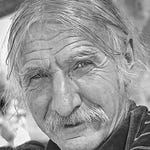Depending On No-thing
Read by David Matt
Chapter 61
Q: Hello, Robert. I hope you are well. Would you mind if I ask you something? You have said that life is supposed to have suffering, and that we can’t really escape it. But many teachers, including the Buddha, say that there is an end to suffering. You say that you are awake—so why do you still suffer?
A: I do not say that life is “supposed” to have suffering—I say that suffering is part of this aliveness, and that efforts to avoid suffering or escape from suffering are a denial of this aliveness. Some of that denial may employ belief in the words of so-called masters, including the Buddha—who, in the mind of modernity, is more than just a master, but an iconic, mythological character whose words are held by many to be absolute truth.
I do not think that anyone’s words are absolute truth. We are all just human here, including Gotama, assuming that such a person actually existed historically. But even if there was once such a man, we cannot know what he really believed or really said, despite the insistence by some Buddhists—mainly the Theravadins—that the suttas in the Pali Canon are accurate historical accounts. Obviously they are not. Those suttas, which are said to be accounts of talks given by Gotama to the monks of his era, were preserved orally for around 450 years—passed from one person to another in the form of stories—until finally, after much debate, they were put into written form during the Fourth Buddhist Council in the first century BCE.
Four or five hundred years is a long time. It’s easy to say “four or five hundred years” but difficult to imagine a span like that in human terms. If you ever played the game of telephone as a child, you will know that even a single sentence can be distorted—and possibly have its meaning changed entirely—in just a few minutes of being passed from mouth to mouth.
So the idea that those suttas are in any way an accurate accounting strains credulity. But so great is the desire of humans to have an infallible authority on whom to rely, that millions of Buddhists take every word of those scriptures as literally true and factual.
And it is not only Theravadins who believe in an end to suffering—that idea has penetrated modern spirituality so fully that contemporary teachers speak of it confidently, as if they themselves had experienced self-consciousness without suffering, leaving students to imagine that, as long as they still suffer, they have not yet come to “Truth.”
That misunderstanding is what moves me to point out that, although I find myself awake, I still suffer.
I still suffer, for example, when I hear the American President, who, in my professional opinion as a psychologist, is seriously mentally ill, talking like a gangster and lying about everything with no regard at all for facts, while the people who voted for him dote on every word of that hate-filled, racist, sexist verbal diarrhea. That cat is one sick kitty, and he is contagious.
I suffer from having to see that I am part of a race—the human race—that consists of a large proportion of nincompoops and that many of the habits and customs of this world of ours are fashioned by nincompoops for nincompoops.
Or I come upon a dog with a chain around his throat tied up in the sun with no water in his bowl, a look of despair in his eyes. He has been tortured beyond even looking for help from me, the way a normal dog would. He won’t look me in the eye. And when I try to bring water to him, I find myself being threatened with physical harm by the dog’s owner. It’s his fucking dog.
If I did not suffer at such a sight and did not want to alleviate the dog’s suffering, I would consider that a form of spiritual bypassing. So, although I am not thirsty myself, I must suffer along with the dog— and that cannot be explained away by “awakening.”
I guess it’s hard for you to get over hearing that even the wide awake ones among us must suffer. Suffering cannot be avoided. Trying to avoid or escape suffering just makes matters worse. I despise hearing from “teachers” that suffering is “all in your mind.” Everything is all in your mind—but that does not mean it’s not real.
I was talking with my friend, Dr. Robert K. Hall, an expert on Theravada Buddhism, a dharma teacher himself, and a lifelong meditator in the vipassana tradition, who, at the time of this conversation, was in hospice care, and in considerable physical distress. We were discussing suffering and the Four Noble Truths, which Robert had said were “kindergarten stuff, meant for beginners.”
Robert recalled a conversation with Jack Kornfield in which Robert said, “Jack, there’s no escape from suffering. What is this bullshit?” And, Robert told me, Jack agreed. He doesn’t know anyone who has escaped.
Now, contemporary Buddhist teachers never claim to be “enlightened.” A faux pas like that would put them beyond the pale. But they do commonly speak as if enlightened. Jack Kornfield, for example, is famous for saying, “Enlightenment is an accident, but spiritual practice makes you accident-prone.” Well, logically, how do you know that if you are not enlightened?
So even honored teachers may have two accounts: the public account, in which the teacher speaks about the end of suffering, and how to pursue it through “practice,” such as Jack’s books and lectures, and the private account that is shared only with a trusted friend (if at all), in which you come clean: if enlightenment means the end of suffering, you really aren’t enlightened, and have never met anyone who was.
This is not guesswork on my part, but a factual account of my observations of teachers, and how they talk backstage when they are not teaching.
If you have an interest in spirituality and spiritual teaching, it is crucial to understand this point. Most teaching represents a conveyance of tradition—not a phenomenology of direct experience. So if you want the boilerplate version of spirituality—to be instructed in Buddhist dharma, for example, or nonduality—go sit at someone’s feet. There, as a supplicant, you can get all the “Truth” you like. But if you want to see things more as they are, forget all that hot air and find your own mind—which is yours to live with, like it or not, including suffering.
As soon as one really comprehends the thorny truth that, short of death, there is no exit from this aliveness and the relentless, painful self-awareness that comes with it, freedom is apparent. You are free to be you exactly as you are right now—and not free to be anything else, no matter what some teacher tells you.
We all want what we want when we want it. Wanting what one does not have is a form of suffering. You may want a pain-free version of aliveness, with the transcendence of suffering as the final condition, the attainment—but think of the countless people on the Earth who, at this very moment, are not thinking about transcendence at all but only wanting some clean water to drink, or a safe place to sleep.
Q: What can one do then when there is suffering? The mind resists it. Thoughts of wanting to escape come up unheeded. This wishing for the end of suffering can’t be stopped. What can one do?
A: I advise forgetting what others say and allowing yourself to open your mind to this moment. Breathe in, breathe out. When you feel thirsty, drink. Be grateful that you have clean water to drink. Eat enough to keep the body healthy. Sleep, walk around, carry out tasks, laugh, cry. Each moment must be chewed up and swallowed as best you can. That’s life.
Q: Openness like that seems too painful. And the tendency to resist suffering or escape seems unstoppable.
A: If that is so—if the tendency to resist seems unstoppable—then what is your option? If that frame of mind really is, for you, unstoppable, then there is nothing for it. You will resist suffering, and you will try to escape it. That is what I mean by saying that you are free to be yourself exactly as you are right now, and not free to be anything else.
So of what possible use are words from me? I am someone who is not resisting—and I still suffer.
Q: When there is resistance, just chew it up and swallow it all, too?
A: Yes, and try not to choke on it.
Q: When you say awakening never ends, what exactly do you mean? Do you mean that noticing that this present moment is just what it is, is a never-ending process?
A: Yes, I do mean that, and also that one’s understanding of oneself and the world will never be final.
Q: That is true. You don’t know if tomorrow, all your so-called “understanding” and “realizations” will completely reverse or something. What we have or know, and everything else can change in an instant.
A: Yes. That’s the idea. Don’t get stuck anywhere. Just keep walking.








Share this post